Expenditures of the Aged Chartbook, 2015
About This Chartbook
CUs Aged 65 or Older
CUs, by Age- CUs Aged 65 or Older:
2005, 2010, & 2015
Appendix
About This Chartbook
Source of the Data
The Expenditures of the Aged Chartbook is based on data from the 2015 Consumer Expenditure Survey Public-Use File. The survey provides continuous comprehensive data on the buying habits of US consumers. The survey is representative of the total civilian noninstitutionalized population of the United States, as well as that portion of the institutionalized population living in group quarters (excluding military personnel living on military bases and residents of nursing homes).
The Consumer Expenditure Survey program consists of two separate components, each with its own questionnaire and independent sample:
- An interview survey, which collects data on monthly expenditures such as housing.
- A diary survey, which collects weekly expenditures of frequently purchased items such as food and beverages.
The Census Bureau collects the data under contract with the Bureau of Labor Statistics. Further details on the Consumer Expenditure Survey program are available at https://www.bls.gov/cex/home.htm. Documentation on the two survey components and their integration, as well as limitations of the data, are found on the Frequently Asked Questions page at https://www.bls.gov/cex/csxfaqs.htm. In this chartbook, medians and distributions are calculated using only the interview survey. Means are calculated using data from both the interview and diary surveys. The mean household expenditure for each expenditure category is the sum of spending for that category by all households divided by the sum of total expenditures for all households.
Surveys are subject to sampling error because observations are not taken for the entire population. Information on the sampling error in the 2015 Survey of Consumer Expenditures can be found in the survey documentation available at https://www.bls.gov/cex/2015/csxintvw.pdf.
Definition and Explanation of Key Terms
The definitions of key terms are abbreviated versions of those used by the Bureau of Labor Statistics, which presents detailed definitions in its glossary at https://www.bls.gov/cex/csxgloss.htm.
Unit of analysis
Consumer unit (CU). Expenditures in the Consumer Expenditure Survey are measured for the CU, defined as the members of a household related by blood, marriage, adoption, or other legal arrangement; a single person living alone or sharing a household with others but who is financially independent; or two or more persons living together who share responsibility for at least two of the following three major expense categories: food, housing, and other (comprising various items, listed below under “Components of expenditures”). Students living in university-sponsored housing also are included in the sample as separate CUs. The Consumer Expenditure Survey is a survey of the noninstitutionalized population and therefore does not include nursing home residents and their expenditures.
Reference person. The first CU member mentioned by the respondent when asked to “Start with the name of the person or one of the persons who owns or rents the home.” The relationship of the other members of the CU is determined with respect to this person.
Age of the CU. The age of the reference person.
Size of the CU. The number of persons whose usual place of residence at the time of the interview is in the sample unit. In the interview portion of the 2015 Consumer Expenditure Survey, the size of the CU decreased as the age of the CU increased, as shown in the chart below. The average number of persons in a CU, by age of the unit, was 2.2 for CUs aged 55–64, 1.8 for those aged 65–74, and 1.6 for those 75 or older.
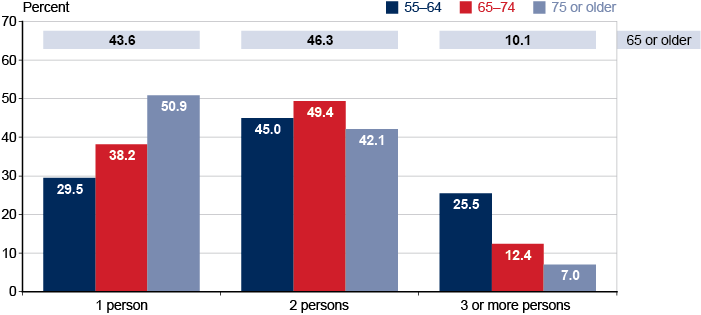
| Size of consumer unit | 55–64 | 65–74 | 75 or older | 65 or older |
|---|---|---|---|---|
| 1 person | 29.5 | 38.2 | 50.9 | 43.6 |
| 2 persons | 45.0 | 49.4 | 42.1 | 46.3 |
| 3 or more persons | 25.5 | 12.4 | 7.0 | 10.1 |
Expenditures and income
Total expenditures. The sum of all expenditures in 2015.
Per capita expenditures. Expenditures of the CU divided by the size of the CU.
Total income. The sum of all income sources before taxes in 2015, including the value of food stamps.
Earned income. Income from wages and salaries or self-employment in 2015, including income from businesses and farms.
Components of expenditures
Housing. The sum of all housing expenditures in 2015, including the expenses associated with renting or owning a home such as rent, mortgage interest, property taxes, maintenance, utilities, furnishings, renters' or homeowners' insurance, home appliances, cleaning supplies, textiles, and luggage. It does not include payments toward mortgage principal, which are considered to be part of household savings rather than expenditures. Housing tenure refers to the CU's principal place of residence during the survey. “Owners” include CUs living in their own homes, cooperatives or condominium apartments, or townhouses. “Renters” include CUs paying rent or living rent-free in lieu of wages.
Food. The sum of all food expenditures in 2015, including expenditures made at grocery stores and restaurants.
Health care. The sum of all out-of-pocket health care expenditures in 2015, including public and private health insurance premiums and payments for doctor visits, eye and dental care and aids, hospital services, lab tests, and prescription drugs.
Transportation. The sum of all transportation expenditures in 2015, including the purchase of new and used cars and trucks; insurance; gas and motor oil; finance charges; maintenance and repairs; licenses; rentals; other charges; and fares for travel by airplane, bus, train, and taxi.
Apparel. The sum of all apparel expenditures in 2015, including clothing, footwear, laundry, sewing, watches, jewelry, and storage.
Entertainment. The sum of all entertainment expenditures in 2015, including club fees, sport fees, theater tickets, televisions, stereos, pet expenses, toys, hobbies, campers, boats, and sporting equipment.
Other. The sum of all other expenditures in 2015, including those for alcohol, tobacco, personal care products and services, reading materials, education, miscellaneous items, cash contributions to persons or organizations outside the CU, personal insurance, pension contributions, and Social Security payroll taxes.
Travel. Travel is a combination of components of the above categories. It is the sum of all expenditures on out-of-town trips in 2015, including food; alcohol; lodging; gas; rental of autos, trucks, motorcycles, boats, campers, and other vehicles; parking; tolls; fares for travel by airplane, bus, train, and taxi; and recreation and entertainment.
Notes about the Data
Data in this report reflect expenditures during calendar year 2015. The Trends section also includes comparative data on expenditures in 2005 and 2010.
Data are from the interview portion of the 2015 Consumer Expenditure Survey, unless otherwise noted.
Some charts contain data from an integration of the diary and the interview portions of the 2015 Consumer Expenditure Survey. Some expenditure items are measured in either the interview survey or the diary survey; others are measured in both the interview survey and the diary survey. In the latter cases, the data source used for a given item is the survey that yields the smallest standard error for that item. Items are aggregated into summary categories that may include data from both the interview and diary portions.
Charts variously show mean, median, and percentile values. Because means can be influenced by high-spending outliers, mean expenditure data can be highly skewed. In those cases, median and percentile figures provide a clearer picture of the distribution of expenditures. However, the interview and diary portions cannot be combined to calculate medians and percentiles because the two surveys have different questionnaires and samples.
Expenditure data are collected at the CU level.
Estimates are based on weighted responses from a sample of the population, as follows:
| Age group | Unweighted | Weighted (millions) |
|---|---|---|
| 55–64 | 1,207 | 24.1 |
| 65–74 | 938 | 17.4 |
| 75 or older | 682 | 12.8 |
| 65 or older | 1,620 | 30.2 |
The estimates in this chartbook, which are based on the 2015 Consumer Expenditure Survey Public-Use File, may vary from those published by the Bureau of Labor Statistics because some Public-Use data are adjusted to prevent the disclosure of respondents' personal information. For a summary comparison of estimates from the two sources, see the appendix.
Income figures refer to income before taxes. Those figures include some noncash benefits, such as the value of food stamps.
Expenditures include Social Security payroll taxes and property taxes on owned dwellings and vacation homes.
Income quartiles for CUs aged 65 or older are four groups of roughly equal size as determined by their income level, as follows:
| Quartile | Income |
|---|---|
| Lowest | $17,630 or less |
| Low-middle | More than $17,630 but less than or equal to $30,510 |
| High-middle | More than $30,510 but less than or equal to $55,666 |
| Highest | More than $55,666 |
The 2004 Consumer Expenditure Survey was the first in which the Bureau of Labor Statistics imputed income for units that did not report their amounts and sources of income. In the first edition of this chartbook, which was based on the 2002 Consumer Expenditure Survey, CUs that did not have complete income information were excluded from the analysis. All subsequent editions have included CUs that reported their income as well as those for which the Bureau of Labor Statistics imputed income.
Charts that show data by age group also show aggregate data for CUs aged 65 or older in a shaded bar in (or adjacent to) the chart.
In charts showing percentage distributions, totals do not necessarily equal the sum of rounded components.
Some charts present data as box plots. The upper and lower edges of the box plots represent the values at the 75th and 25th percentiles. The box therefore presents the interquartile range, or the middle 50 percent of the data, to indicate the variability of the values. Within the box, a third horizontal line indicates the median (50th percentile) value. A diamond symbol (♦) indicates the mean. A sample box plot appears below.
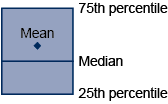
CUs Aged 65 or Older
Total Expenditures
Annual expenditure amounts for all CUs aged 65 or older ranged widely. In 2015, about 15 percent spent less than $15,000, and almost 12 percent spent $75,000 or more. Median expenditures were $30,846. A relatively small proportion of CUs with very high expenditures strongly influenced the overall mean, which was $44,375. (Median and mean values are not shown.)
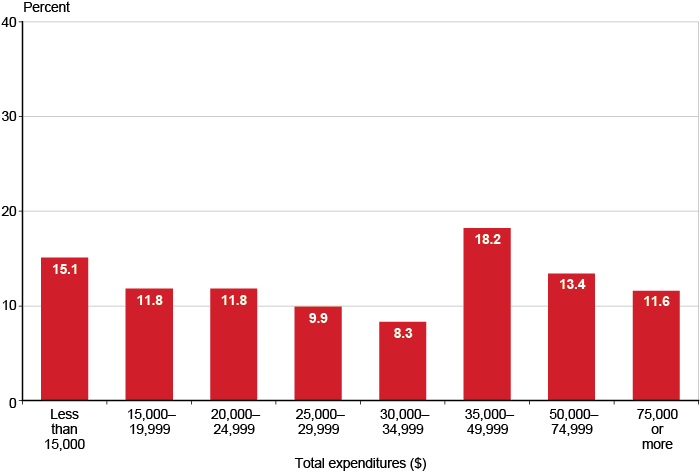
| Total expenditures ($) | Percent |
|---|---|
| Less than 15,000 | 15.1 |
| 15,000–19,999 | 11.8 |
| 20,000–24,999 | 11.8 |
| 25,000–29,999 | 9.9 |
| 30,000–34,999 | 8.3 |
| 35,000–49,999 | 18.2 |
| 50,000–74,999 | 13.4 |
| 75,000 or more | 11.6 |
Per Capita Expenditures
Per capita expenditures account for differences in the number of persons in a CU. Thirty-five percent of CUs aged 65 or older had per capita expenditures of less than $15,000, and almost 20 percent had per capita expenditures of $35,000 or more. Median ($19,436) and mean ($27,495) per capita expenditures equaled almost two-thirds of median and mean total expenditures for CUs aged 65 or older ($30,846 and $44,375, respectively; values not shown).
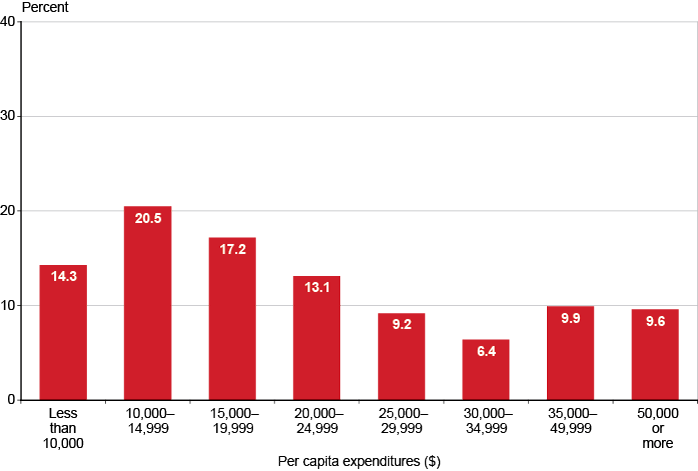
| Per capita expenditures ($) | Percent |
|---|---|
| Less than 10,000 | 14.3 |
| 10,000–14,999 | 20.5 |
| 15,000–19,999 | 17.2 |
| 20,000–24,999 | 13.1 |
| 25,000–29,999 | 9.2 |
| 30,000–34,999 | 6.4 |
| 35,000–49,999 | 9.9 |
| 50,000 or more | 9.6 |
Expenditures, by Income Quartile
For CUs aged 65 or older, median expenditures in the highest income quartile ($56,154) more than tripled those in the lowest income quartile ($16,395). In the lowest income quartile, expenditures at the 25th and 75th percentiles were $11,647 and $24,923, respectively; the corresponding values in the highest income quartile were $40,259 and $85,419. Although the difference in spending between the 25th and 75th expenditure percentiles was greater in absolute terms in the highest income quartile than in the lowest income quartile, in relative terms the patterns were quite similar. In all four income quartiles, expenditures at the 75th percentile were about twice as large as expenditures at the 25th percentile.
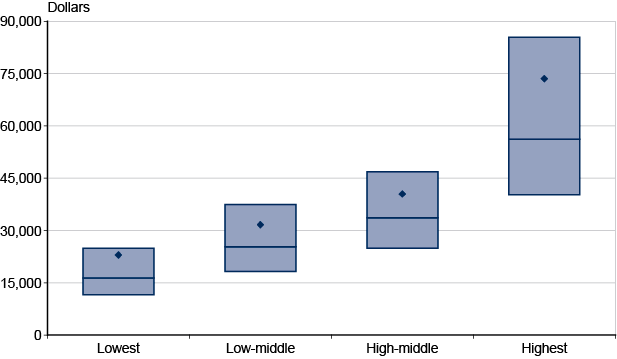
| Lowest | Low-middle | High-middle | Highest | |
|---|---|---|---|---|
| 75th percentile | 24,923 | 37,491 | 46,890 | 85,419 |
| Median | 16,395 | 25,315 | 33,586 | 56,154 |
| 25th percentile | 11,647 | 18,266 | 24,983 | 40,249 |
| Mean (♦) | 22,968 | 31,674 | 40,488 | 73,547 |
| SOURCE: Interview portion of the 2015 Consumer Expenditure Survey. Means were computed using both the interview and diary portions of the survey. | ||||
Per Capita Expenditures, by Income Quartile
Median per capita expenditures for CUs aged 65 or older in the highest income quartile ($28,077) were nearly double those in the lowest income quartile ($14,359). Per capita expenditures at the 25th and 75th percentiles of the lowest income quartile were $10,211 and $21,359, respectively. In the highest income quartile, 25th and 75th percentile per capita expenditures were $18,907 and $44,695, respectively.
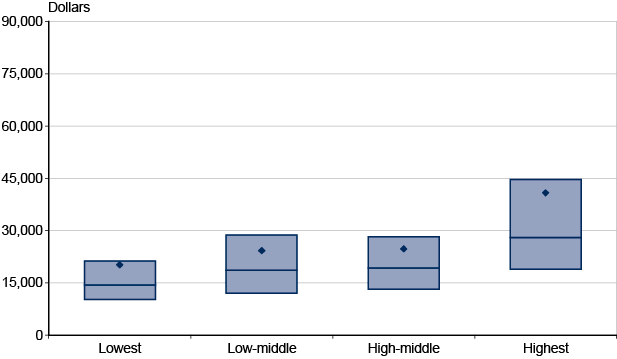
| Lowest | Low-middle | High-middle | Highest | |
|---|---|---|---|---|
| 75th percentile | 21,359 | 28,744 | 28,251 | 44,695 |
| Median | 14,359 | 18,667 | 19,252 | 28,077 |
| 25th percentile | 10,211 | 12,055 | 13,114 | 18,907 |
| Mean (♦) | 20,186 | 24,275 | 24,778 | 40,831 |
| SOURCE: Interview portion of the 2015 Consumer Expenditure Survey. Means were computed using both the interview and diary portions of the survey. | ||||
Expenditures, by Earned Income Status
Although not shown in the chart below, median expenditures for CUs aged 65 or older with no earned income ($26,291) equaled 60 percent of median expenditures for those with earned income ($43,535). Close to three-quarters (71 percent) of CUs aged 65 or older had no earned income. The chart shows that more than one-third (34 percent) of CUs with no earned income spent less than $20,000 annually, compared with 9 percent of those with earned income. Conversely, 42 percent of CUs with earned income spent $50,000 or more, compared with only 18 percent of CUs with no earned income. Per capita expenditures exhibited similar patterns.
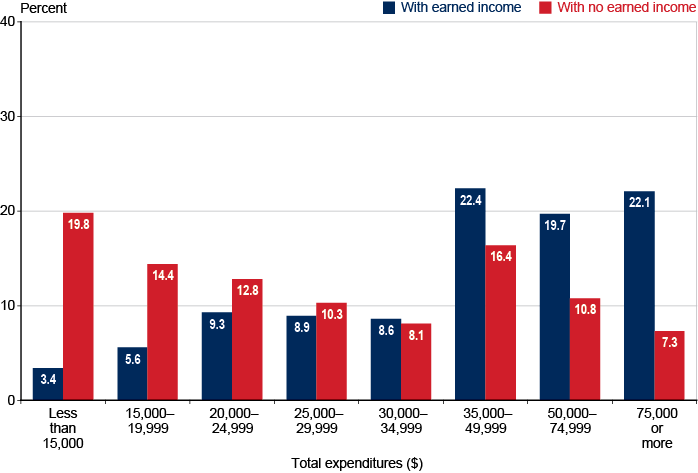
| Total expenditues ($) | With earned income | With no earned income |
|---|---|---|
| Less than 15,000 | 3.4 | 19.8 |
| 15,000–19,999 | 5.6 | 14.4 |
| 20,000–24,999 | 9.3 | 12.8 |
| 25,000–29,999 | 8.9 | 10.3 |
| 30,000–34,999 | 8.6 | 8.1 |
| 35,000–49,999 | 22.4 | 16.4 |
| 50,000–74,999 | 19.7 | 10.8 |
| 75,000 or more | 22.1 | 7.3 |
Components of Expenditures
Housing was the largest component of expenditures (35 percent) for CUs aged 65 or older. Other large components included transportation (15 percent), out-of-pocket health care (13 percent), and food (12 percent). Smaller components included entertainment (6 percent) and apparel (2 percent). Other types of expenditures, including those for alcohol, tobacco, personal care, reading materials, education, miscellaneous items, cash contributions to persons or organizations outside the CU, personal insurance, pension contributions, and Social Security payroll taxes, accounted for 16 percent. Social Security payroll taxes and pension contributions were small components of total expenditures (3 percent and 2 percent, respectively). Per capita expenditures were similarly distributed.
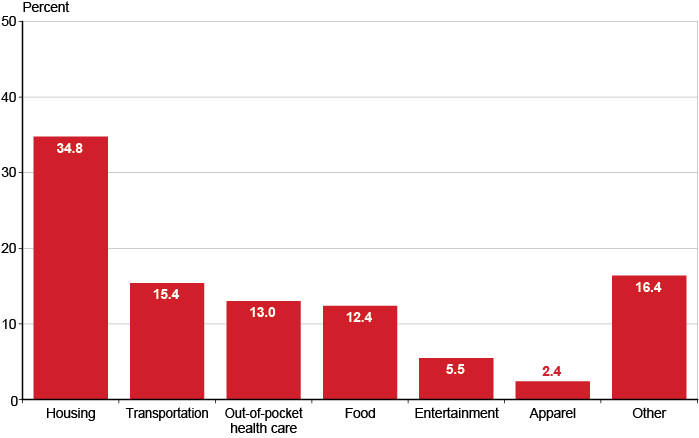
Components of Expenditures, by Earned Income Status
CUs aged 65 or older spent similar shares on most expenditure components regardless of whether they had earned income. Housing was the largest expenditure for both groups (32 percent for those with earned income and 37 percent for those with no earned income). Expenditures for transportation, food, and entertainment were about the same between both groups, whereas out-of-pocket health care expenditures were much lower for those with earned income (11 percent) than for those with no earned income (15 percent). Conversely, other expenditures were higher for those with earned income (21 percent, including 7 percent for Social Security payroll taxes and 3 percent for pension contributions) than for those with no earned income (13 percent). (CUs with no earned income would not incur Social Security payroll taxes or pension contributions.)
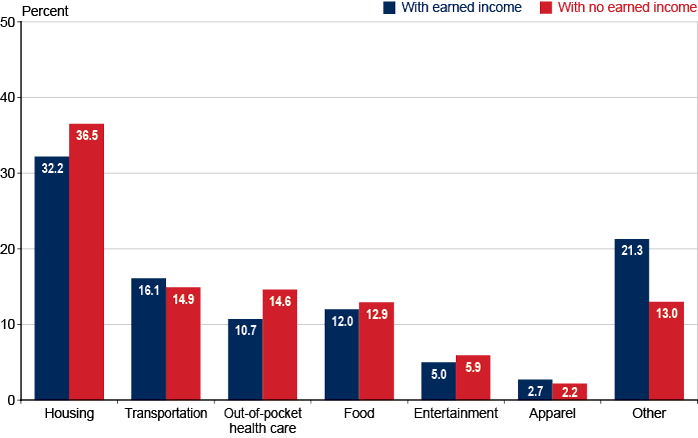
| Component | With earned income | With no earned income |
|---|---|---|
| Housing | 32.2 | 36.5 |
| Transportation | 16.1 | 14.9 |
| Out-of-pocket health care | 10.7 | 14.6 |
| Food | 12.0 | 12.9 |
| Entertainment | 5.0 | 5.9 |
| Apparel | 2.7 | 2.2 |
| Other | 21.3 | 13.0 |
Components of Expenditures, by Selected Income Quartile
The proportion of expenditures allocated for housing, food, and out-of-pocket health care was 26 percent higher for CUs in the lowest income quartile than for those in the highest income quartile. For CUs aged 65 or older in the lowest income quartile, proportions of total expenditures allocated to housing (41 percent), food (14 percent), and out-of-pocket health care (13 percent) exceeded those of CUs in the highest income quartile (32 percent, 11 percent, and 11 percent, respectively). Both income groups allocated similar percentages to entertainment and apparel. CUs in the highest income quartile allocated 17 percent of expenditures to transportation compared with 11 percent for CUs in the lowest quartile. Other expenditures accounted for 21 percent of the total among CUs in the highest income quartile and 14 percent among CUs in the lowest income quartile.
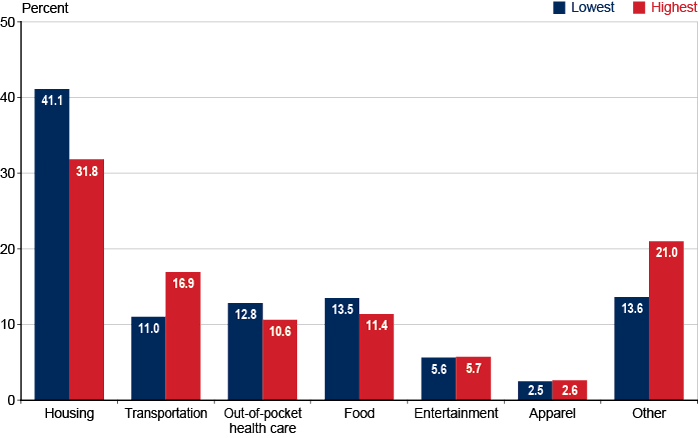
| Component | Lowest | Highest |
|---|---|---|
| Housing | 41.1 | 31.8 |
| Transportation | 11.0 | 16.9 |
| Out-of-pocket health care | 12.8 | 10.6 |
| Food | 13.5 | 11.4 |
| Entertainment | 5.6 | 5.7 |
| Apparel | 2.5 | 2.6 |
| Other | 13.6 | 21.0 |
CUs, by Age
Total Expenditures
Expenditure amounts varied by age. This section of the chartbook examines three age groups: 55–64, 65–74, and 75 or older. Median expenditures for CUs aged 55–64 ($42,263) were 57 percent higher than those of CUs aged 75 or older ($26,845). For CUs aged 55–64, 25th and 75th percentile expenditures were $25,198 and $67,077, respectively; the corresponding values for CUs aged 75 or older were $17,005 and $44,123. Per capita expenditures followed the same pattern.
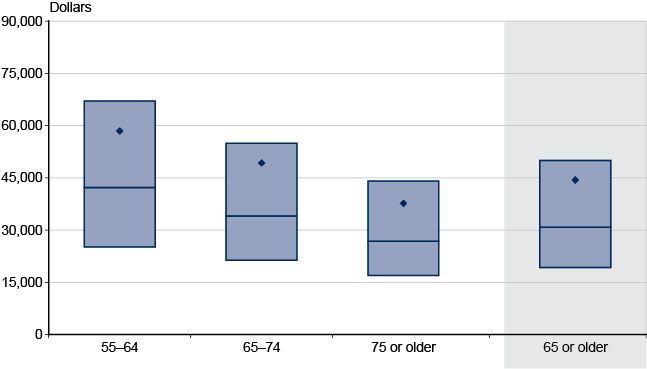
| 55–64 | 65–74 | 75 or older | 65 or older | |
|---|---|---|---|---|
| 75th percentile | 67,077 | 54,904 | 44,123 | 49,934 |
| Median | 42,263 | 34,008 | 26,845 | 30,846 |
| 25th percentile | 25,198 | 21,356 | 17,005 | 19,280 |
| Mean (♦) | 58,480 | 49,294 | 37,696 | 44,375 |
| SOURCE: Interview portion of the 2015 Consumer Expenditure Survey. Means were computed using both the interview and diary portions of the survey. | ||||
Components of Expenditures
Although the distribution of spending among expenditure components varied by age, housing accounted for the largest share across all age groups, ranging from 31 percent to 37 percent. CUs aged 75 or older allocated 15 percent of expenditures to out-of-pocket health care, while among CUs aged 55–64, those costs accounted for 9 percent of expenditures. Compared with CUs aged 55–64, those aged 75 or older allocated less of their expenditures to transportation (14 percent versus 17 percent) and to other expenditures (15 percent versus 23 percent). The share of expenditures allocated to food was similar for all three age groups, ranging from 12 percent to 13 percent. CUs in all age groups allocated relatively small proportions of expenditures to entertainment (from 5 percent to 6 percent) and apparel (from 2 percent to 3 percent).
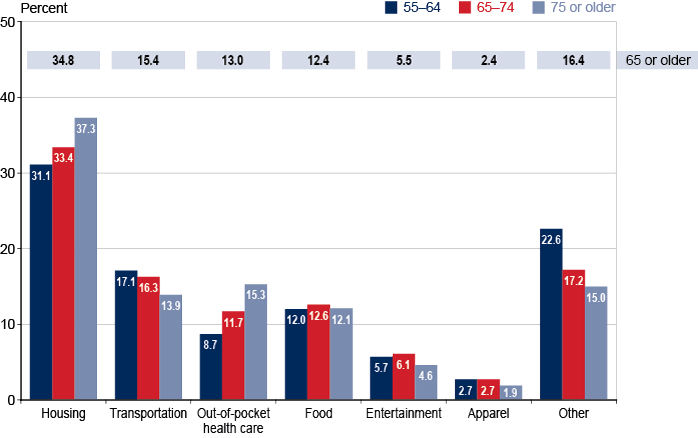
| Component | 55–64 | 65–74 | 75 or older | 65 or older |
|---|---|---|---|---|
| Housing | 31.1 | 33.4 | 37.3 | 34.8 |
| Transportation | 17.1 | 16.3 | 13.9 | 12.4 |
| Out-of-pocket health care | 8.7 | 11.7 | 15.3 | 13.0 |
| Food | 12.0 | 12.6 | 12.1 | 15.4 |
| Entertainment | 5.7 | 6.1 | 4.6 | 2.4 |
| Apparel | 2.7 | 2.7 | 1.9 | 5.5 |
| Other | 22.6 | 17.2 | 15.0 | 16.4 |
Housing Expenditures
Housing was the largest component of expenditures for all three age groups. The median share of expenditures allocated to housing was about 37 percent for all three age groups. The median amount spent on housing declined for successively older groups, from $14,420 for CUs aged 55–64 to $11,920 for CUs aged 65–74 and $9,516 for CUs aged 75 or older. At the 25th and 75th percentiles, respective housing expenditures were $8,424 and $23,864 for CUs aged 55–64 and $5,724 and $16,200 for CUs aged 75 or older. Per capita median housing expenditures were $7,360 for the 55–64 age group and $6,312 for those aged 75 or older.
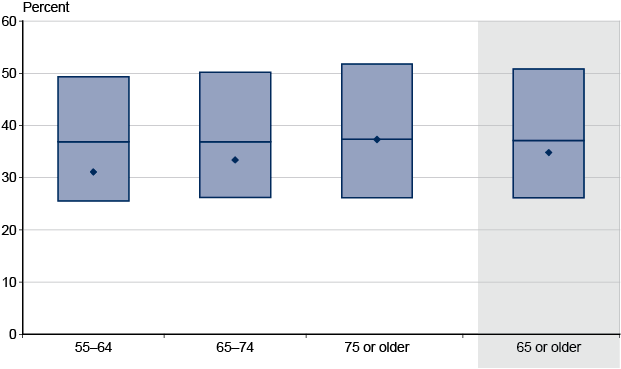
| 55–64 | 65–74 | 75 or older | 65 or older | |
|---|---|---|---|---|
| 75th percentile | 49.3 | 50.2 | 51.8 | 50.8 |
| Median | 36.9 | 36.9 | 37.4 | 37.1 |
| 25th percentile | 25.5 | 26.2 | 26.1 | 26.1 |
| Mean (♦) | 31.1 | 33.4 | 37.3 | 34.8 |
| SOURCE: Interview portion of the 2015 Consumer Expenditure Survey. Means were computed using both the interview and diary portions of the survey. | ||||
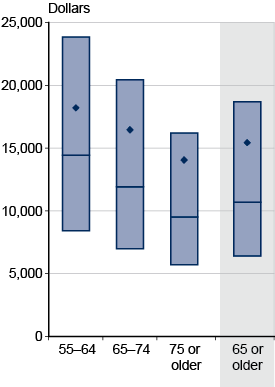
| 55–64 | 65–74 | 75 or older | 65 or older | |
|---|---|---|---|---|
| 75th percentile | 23,864 | 20,460 | 16,200 | 18,700 |
| Median | 14,420 | 11,920 | 9,516 | 10,704 |
| 25th percentile | 8,424 | 6,980 | 5,724 | 6,400 |
| Mean (♦) | 18,213 | 16,470 | 14,051 | 15,447 |
| SOURCE: Interview portion of the 2015 Consumer Expenditure Survey. Means were computed using both the interview and diary portions of the survey. | ||||
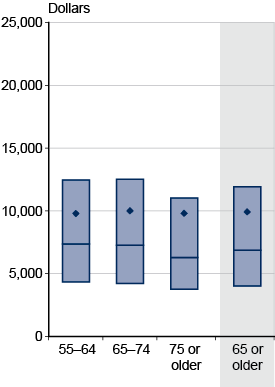
| 55–64 | 65–74 | 75 or older | 65 or older | |
|---|---|---|---|---|
| 75th percentile | 12,472 | 12,548 | 11,048 | 11,928 |
| Median | 7,360 | 7,272 | 6,312 | 6,862 |
| 25th percentile | 4,346 | 4,220 | 3,774 | 4,024 |
| Mean (♦) | 9,795 | 10,017 | 9,814 | 9,930 |
| SOURCE: Interview portion of the 2015 Consumer Expenditure Survey. Means were computed using both the interview and diary portions of the survey. | ||||
Housing Tenure
Most CUs in all three age groups were homeowners, and the proportion of CUs that owned a home without a mortgage increased with age. CUs aged 55–64 were the least likely to own a home without a mortgage (35 percent). Among CUs aged 65–74, 51 percent owned their homes with no mortgage. Among CUs aged 75 or older, the proportion that owned a home with no mortgage was nearly six times the proportion that owned with a mortgage (66 percent compared with 12 percent). The mean percentage of total expenditures allocated to housing was lowest for homeowners without a mortgage (between 26 percent and 32 percent) and highest for CUs that rented a house or apartment (40 percent to 54 percent).

| Housing tenure | 55–64 | 65–74 | 75 or older | 65 or older |
|---|---|---|---|---|
| Owner with mortgage | 39.9 | 28.7 | 11.6 | 21.5 |
| Owner without mortgage | 34.9 | 51.0 | 65.8 | 57.2 |
| Renter | 25.1 | 20.3 | 22.6 | 21.3 |

| Housing tenure | 55–64 | 65–74 | 75 or older | 65 or older |
|---|---|---|---|---|
| Owner with mortgage | 31.7 | 34.5 | 40.5 | 35.7 |
| Owner without mortgage | 25.8 | 29.7 | 32.2 | 30.8 |
| Renter | 40.3 | 44.1 | 54.4 | 48.7 |
Food Expenditures
The median percentage of total expenditures spent on food was about 16 percent for CUs aged 55–64 and 17 percent for those in the two older age groups. Including all age groups, the 25th and 75th percentile values ranged from 11 percent to 25 percent, respectively. The median amount spent on food was 41 percent higher for CUs aged 55–64 ($6,600) than for CUs aged 75 or older ($4,680). Median per capita food expenditures were about one-tenth higher for CUs aged 55–64 ($3,374) than for CUs aged 75 or older ($3,094).
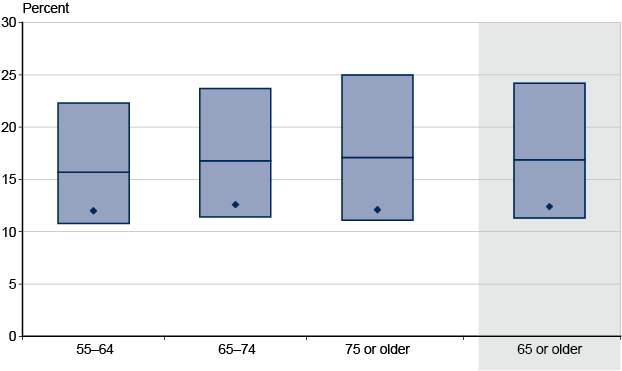
| 55–64 | 65–74 | 75 or older | 65 or older | |
|---|---|---|---|---|
| 75th percentile | 22.3 | 23.7 | 25.0 | 24.2 |
| Median | 15.7 | 16.8 | 17.1 | 16.9 |
| 25th percentile | 10.8 | 11.4 | 11.1 | 11.3 |
| Mean (♦) | 12.0 | 12.6 | 12.1 | 12.4 |
| SOURCE: Interview portion of the 2015 Consumer Expenditure Survey. Means were computed using both the interview and diary portions of the survey. | ||||
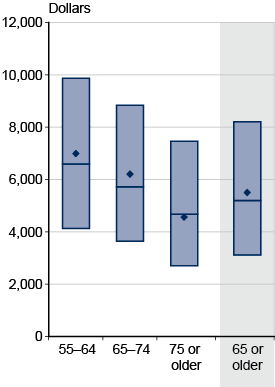
| 55–64 | 65–74 | 75 or older | 65 or older | |
|---|---|---|---|---|
| 75th percentile | 9,880 | 8,840 | 7,460 | 8,216 |
| Median | 6,600 | 5,720 | 4,680 | 5,200 |
| 25th percentile | 4,120 | 3,640 | 2,704 | 3,120 |
| Mean (♦) | 6,993 | 6,206 | 4,562 | 5,503 |
| SOURCE: Interview portion of the 2015 Consumer Expenditure Survey. Means were computed using both the interview and diary portions of the survey. | ||||
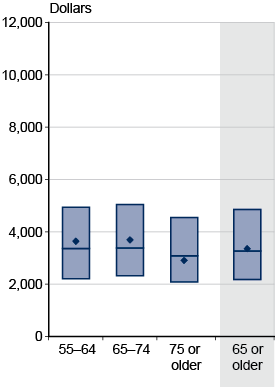
| 55–64 | 65–74 | 75 or older | 65 or older | |
|---|---|---|---|---|
| 75th percentile | 4,940 | 5,046 | 4,550 | 4,853 |
| Median | 3,374 | 3,380 | 3,094 | 3,276 |
| 25th percentile | 2,210 | 2,325 | 2,080 | 2,180 |
| Mean (♦) | 3,643 | 3,694 | 2,908 | 3,358 |
| SOURCE: Interview portion of the 2015 Consumer Expenditure Survey. Means were computed using both the interview and diary portions of the survey. | ||||
Food Prepared and Eaten at Home
Older age groups allocated a larger share of food expenditures to food prepared and eaten at home than did younger age groups. CUs aged 75 or older were more likely to allocate 95 percent or more of their food expenditures to food prepared and eaten at home than were CUs aged 55–64 (33 percent compared with 22 percent). The average percentage of food expenditures allocated to food prepared and eaten at home was 68 percent for CUs aged 55–64 and 65–74, and 69 percent for CUs aged 75 or older (not shown).
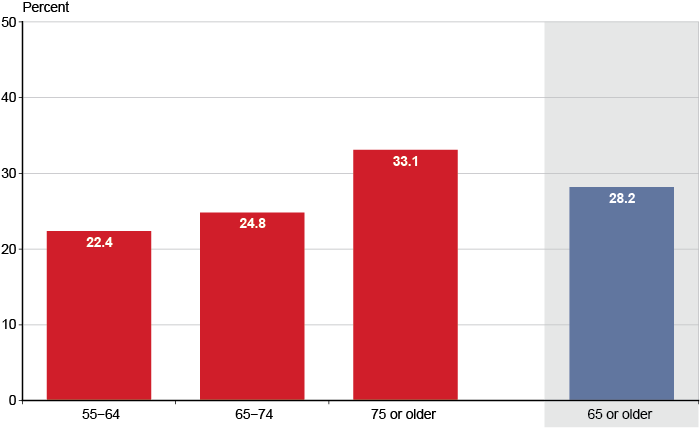
Out-of-Pocket Health Care Expenditures
Median out-of-pocket health care expenditures ranged from 7 percent of total expenditures for CUs aged 55–64 to 14 percent for those aged 75 or older. From the 25th to the 75th percentiles, the share of total expenditures allocated to health care ranged from 2 percent to 13 percent for CUs aged 55–64 and from 8 percent to 23 percent for CUs aged 75 or older. Median out-of-pocket health care expenditures for CUs aged 75 or older ($3,918) were 36 percent higher than those of CUs aged 55–64 ($2,871) but were almost double on a per capita basis ($2,696 compared with $1,404). The Consumer Expenditure Survey covers the noninstitutionalized population and therefore omits nursing home residents and their expenditures.
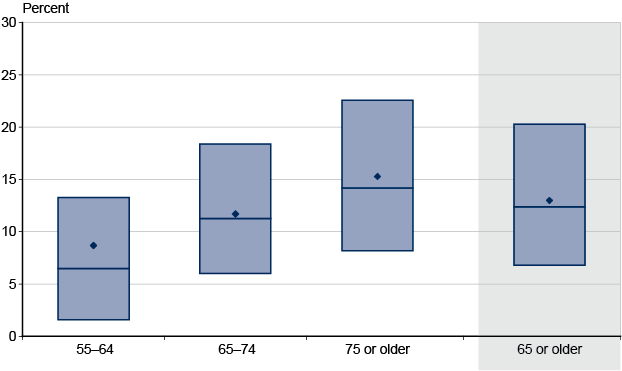
| 55–64 | 65–74 | 75 or older | 65 or older | |
|---|---|---|---|---|
| 75th percentile | 13.3 | 18.4 | 22.6 | 20.3 |
| Median | 6.5 | 11.3 | 14.2 | 12.4 |
| 25th percentile | 1.6 | 6.0 | 8.2 | 6.8 |
| Mean (♦) | 8.7 | 11.7 | 15.3 | 13.0 |
| SOURCE: Interview portion of the 2015 Consumer Expenditure Survey. Means were computed using both the interview and diary portions of the survey. | ||||
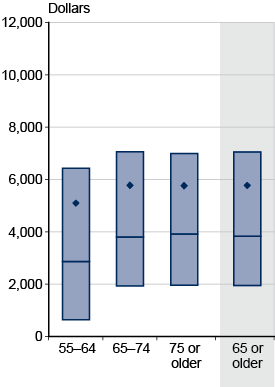
| 55–64 | 65–74 | 75 or older | 65 or older | |
|---|---|---|---|---|
| 75th percentile | 6,432 | 7,066 | 6,990 | 7,044 |
| Median | 2,871 | 3,803 | 3,918 | 3,840 |
| 25th percentile | 632 | 1,932 | 1,955 | 1,942 |
| Mean (♦) | 5,099 | 5,779 | 5,771 | 5,775 |
| SOURCE: Interview portion of the 2015 Consumer Expenditure Survey. Means were computed using both the interview and diary portions of the survey. | ||||
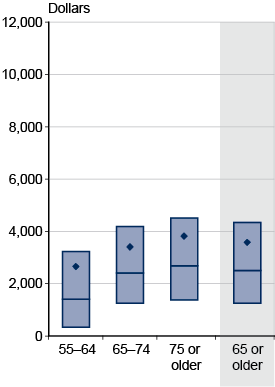
| 55–64 | 65–74 | 75 or older | 65 or older | |
|---|---|---|---|---|
| 75th percentile | 3,235 | 4,199 | 4,506 | 4,343 |
| Median | 1,404 | 2,413 | 2,696 | 2,507 |
| 25th percentile | 336 | 1,259 | 1,380 | 1,259 |
| Mean (♦) | 2,660 | 3,411 | 3,822 | 3,584 |
| SOURCE: Interview portion of the 2015 Consumer Expenditure Survey. Means were computed using both the interview and diary portions of the survey. | ||||
Components of Out-of-Pocket Health Care Expenditures
Health insurance premiums accounted for the largest share of out-of-pocket health care expenditures, comprising two-thirds of the total for all three age groups. Medical services were the second largest component of health care expenditures for CUs, accounting for 17 percent to 19 percent of the total. Drugs were the third largest component, comprising 10 percent to 12 percent of out-of-pocket health care expenditures. Medical supplies accounted for only about 3 percent to 4 percent of out-of-pocket health care expenditures for all age groups.
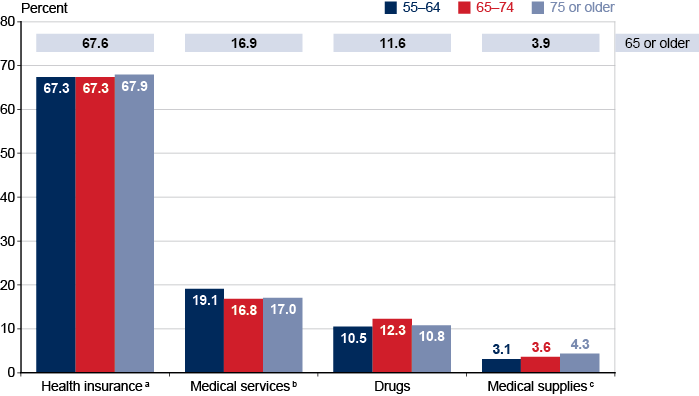
| Component | 55–64 | 65–74 | 75 or older | 65 or older |
|---|---|---|---|---|
| Health insurance a | 67.3 | 67.3 | 67.9 | 67.6 |
| Medical services b | 19.1 | 16.8 | 17 | 16.9 |
| Drugs | 10.5 | 12.3 | 10.8 | 11.6 |
| Medical supplies c | 3.1 | 3.6 | 4.3 | 3.9 |
Transportation Expenditures
Transportation expenditures were lower for CUs aged 75 or older than for those aged 55–64, whether expressed as the median percentage of total expenditures allocated to transportation (7 percent compared with 12 percent), median total transportation expenditures ($1,864 compared with $5,240), or median per capita transportation expenditures ($1,200 compared with $2,589).
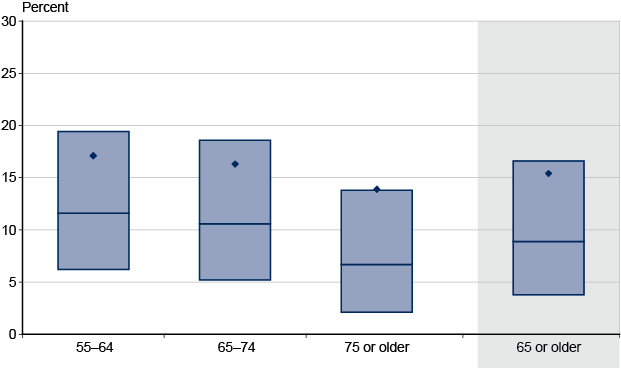
| 55–64 | 65–74 | 75 or older | 65 or older | |
|---|---|---|---|---|
| 75th percentile | 19.4 | 18.6 | 13.8 | 16.6 |
| Median | 11.6 | 10.6 | 6.7 | 8.9 |
| 25th percentile | 6.2 | 5.2 | 2.1 | 3.8 |
| Mean (♦) | 17.1 | 16.3 | 13.9 | 15.4 |
| SOURCE: Interview portion of the 2015 Consumer Expenditure Survey. Means were computed using both the interview and diary portions of the survey. | ||||
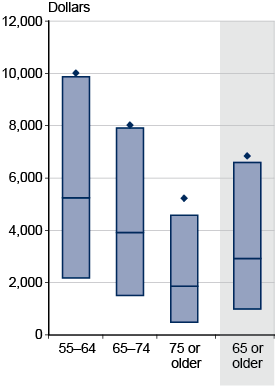
| 55–64 | 65–74 | 75 or older | 65 or older | |
|---|---|---|---|---|
| 75th percentile | 9,880 | 7,920 | 4,580 | 6,596 |
| Median | 5,240 | 3,920 | 1,864 | 2,932 |
| 25th percentile | 2,188 | 1,500 | 480 | 1,000 |
| Mean (♦) | 10,017 | 8,030 | 5,231 | 6,848 |
| SOURCE: Interview portion of the 2015 Consumer Expenditure Survey. Means were computed using both the interview and diary portions of the survey. | ||||
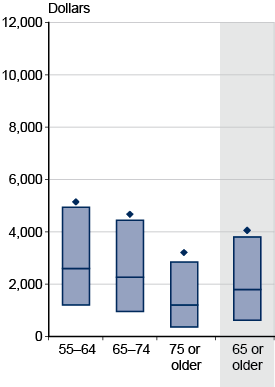
| 55–64 | 65–74 | 75 or older | 65 or older | |
|---|---|---|---|---|
| 75th percentile | 4,940 | 4,438 | 2,848 | 3,804 |
| Median | 2,589 | 2,259 | 1,200 | 1,800 |
| 25th percentile | 1,200 | 960 | 360 | 624 |
| Mean (♦) | 5,145 | 4,672 | 3,210 | 4,056 |
| SOURCE: Interview portion of the 2015 Consumer Expenditure Survey. Means were computed using both the interview and diary portions of the survey. | ||||
Components of Transportation Expenditures
Almost all transportation expenditures were for the purchase and maintenance of vehicles. The purchase of new and used cars and trucks accounted for 41 percent of transportation expenditures for CUs aged 55–64, and for about 37 percent of transportation costs for those aged 65–74 and 75 or older. Across all age groups, other vehicle expenditures made up 52 percent to 54 percent of transportation spending, and only 7 percent to 8 percent of transportation expenditures went to public transportation.
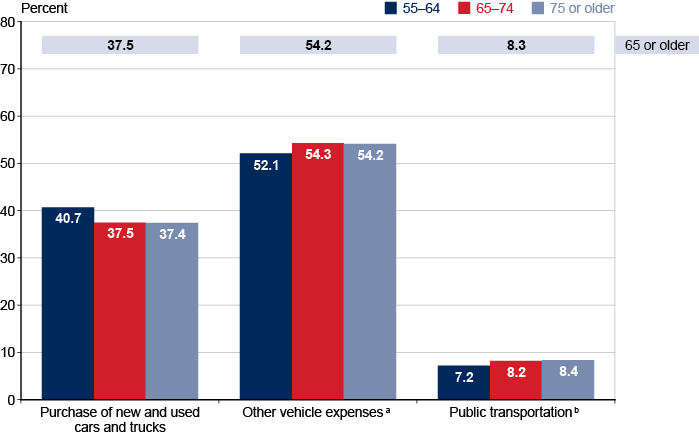
| Component | 55–64 | 65–74 | 75 or older | 65 or older |
|---|---|---|---|---|
| Purchase of new and used cars and trucks | 40.7 | 37.5 | 37.4 | 37.5 |
| Other vehicle expenses a | 52.1 | 54.3 | 54.2 | 54.2 |
| Public transportation b | 7.2 | 8.2 | 8.4 | 8.3 |
Other Expenditures
Other expenditures include such items as alcohol, tobacco, personal care products and services, reading materials, education, miscellaneous items, cash contributions to persons or organizations outside the CU, personal insurance, pension contributions, and Social Security payroll taxes. As a percentage of total expenditures, median expenditures in the “other” category were 12 percent among CUs aged 55–64, 7 percent among CUs aged 65–74, and 6 percent among CUs aged 75 or older. Mean other-category expenditures exceeded the median mainly because of very high cash contributions to individuals and organizations made by a relatively small proportion of the population.
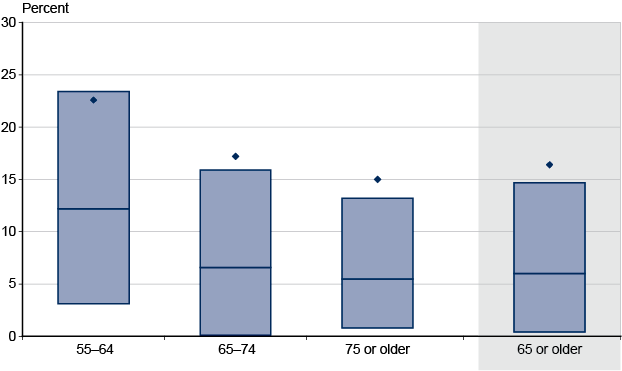
| 55–64 | 65–74 | 75 or older | 65 or older | |
|---|---|---|---|---|
| 75th percentile | 23.4 | 15.9 | 13.2 | 14.7 |
| Median | 12.2 | 6.6 | 5.5 | 6.0 |
| 25th percentile | 3.1 | 0.1 | 0.8 | 0.4 |
| Mean (♦) | 22.6 | 17.2 | 15.0 | 16.4 |
| SOURCE: Interview portion of the 2015 Consumer Expenditure Survey. Means were computed using both the interview and diary portions of the survey. | ||||
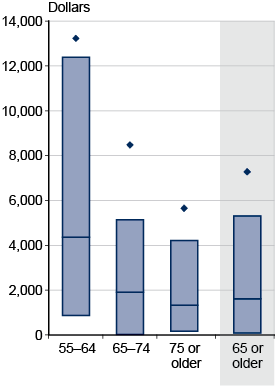
| 55–64 | 65–74 | 75 or older | 65 or older | |
|---|---|---|---|---|
| 75th percentile | 12,400 | 5,140 | 4,212 | 5,312 |
| Median | 4,364 | 1,898 | 1,320 | 1,612 |
| 25th percentile | 875 | 15 | 160 | 80 |
| Mean (♦) | 13,235 | 8,479 | 5,647 | 7,283 |
| SOURCE: Interview portion of the 2015 Consumer Expenditure Survey. Means were computed using both the interview and diary portions of the survey. | ||||
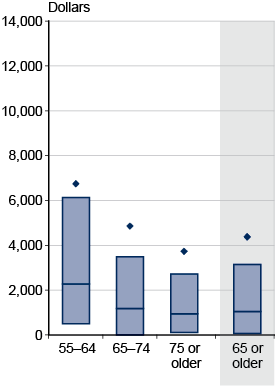
| 55–64 | 65–74 | 75 or older | 65 or older | |
|---|---|---|---|---|
| 75th percentile | 6,136 | 3,496 | 2,718 | 3,140 |
| Median | 2,279 | 1,171 | 952 | 1,050 |
| 25th percentile | 495 | 4 | 120 | 60 |
| Mean (♦) | 6,742 | 4,855 | 3,730 | 4,380 |
| SOURCE: Interview portion of the 2015 Consumer Expenditure Survey. Means were computed using both the interview and diary portions of the survey. | ||||
Components of Other Expenditures
The allocation of other expenditures differed among age groups. Cash contributions were the largest component of other expenditures for CUs aged 65–74 and 75 or older (27 percent and 41 percent, respectively). Social Security payroll taxes were the largest component of other expenditures for CUs aged 55–64 (37 percent).
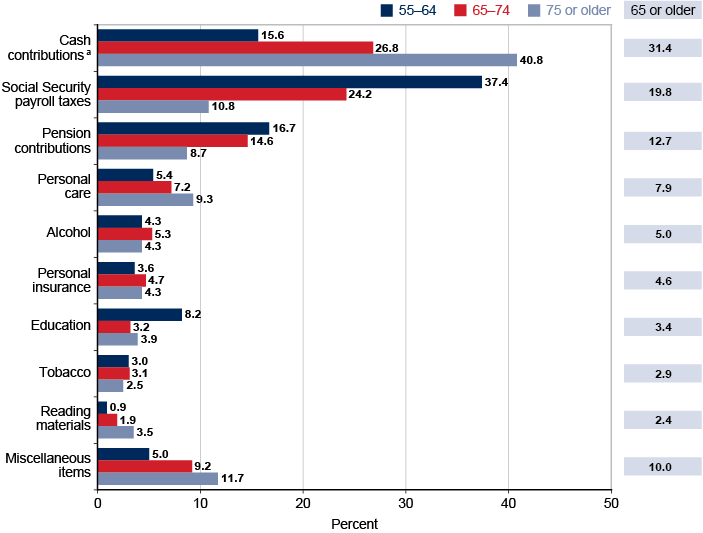
| Component | 55–64 | 65–74 | 75 or older | 65 or older |
|---|---|---|---|---|
| Cash contributions a | 15.6 | 26.8 | 40.8 | 31.4 |
| Social Security payroll taxes | 37.4 | 24.2 | 10.8 | 19.8 |
| Pension contributions | 16.7 | 14.6 | 8.7 | 12.7 |
| Personal care | 5.4 | 7.2 | 9.3 | 7.9 |
| Alcohol | 4.3 | 5.3 | 4.3 | 5.0 |
| Personal insurance | 3.6 | 4.7 | 4.3 | 4.6 |
| Education | 8.2 | 3.2 | 3.9 | 3.4 |
| Tobacco | 3.0 | 3.1 | 2.5 | 2.9 |
| Reading materials | 0.9 | 1.9 | 3.5 | 2.4 |
| Miscellaneous items | 5.0 | 9.2 | 11.7 | 10.0 |
Travel Expenditures
No more than 30 percent of CUs in the three age groups had travel-related expenditures, and the percentage that had such expenditures decreased with age. Travel comprises elements from the housing, food, transportation, and entertainment expenditure categories that were spent on out-of-town trips. This category includes food; alcohol; lodging; gas; rental of autos, trucks, motorcycles, boats, campers, and other vehicles; parking; tolls; fares for travel by airplane, bus, train, and taxi; and recreation and entertainment expenses on out-of-town trips. About 30 percent of CUs aged 55–64, 29 percent of CUs aged 65–74, and 18 percent of CUs aged 75 or older had some expenditures for travel. Among CUs with travel expenditures, the median share of total expenditures allocated to travel was about 4 percent to 5 percent across all age groups.
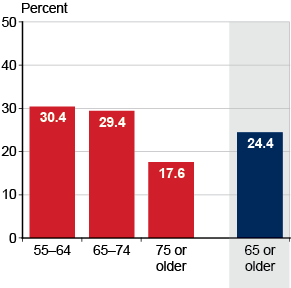
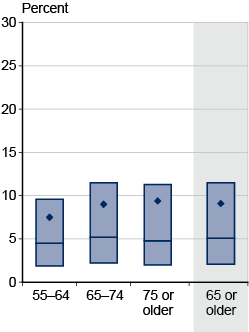
| 55–64 | 65–74 | 75 or older | 65 or older | |
|---|---|---|---|---|
| 75th percentile | 9.6 | 11.5 | 11.3 | 11.5 |
| Median | 4.5 | 5.2 | 4.8 | 5.1 |
| 25th percentile | 1.9 | 2.2 | 2.0 | 2.1 |
| Mean (♦) | 7.5 | 9.0 | 9.4 | 9.1 |
| SOURCE: Interview portion of the 2015 Consumer Expenditure Survey. Means were computed using both the interview and diary portions of the survey. | ||||
CUs Aged 65 or Older: 2005, 2010, & 2015
NOTE: The previous edition of the Expenditures of the Aged Chartbook showed expenditures for 2010. The remainder of this edition shows expenditures in 2005, 2010, and 2015 for CUs aged 65 or older. The Consumer Expenditure Survey is a cross-sectional survey in which the sampled households change from year to year. Therefore, the data presented in these charts are snapshots of all CUs aged 65 or older in those three years; that is, the charts do not represent the experience of the same group of households from year to year. Expenditures have been indexed to 2015 dollars using the Consumer Price Index for All Urban Consumers (CPI-U).
Trends in CU Size
In general, the size of CUs aged 65 or older grew slightly between 2005 and 2015. The proportion of CUs with just one person fell from 47 percent to 44 percent, while the proportion with two persons rose from 43 percent to 46 percent. The proportion of CUs with three or more persons was about 9 percent in 2005 and 10 percent in 2015.
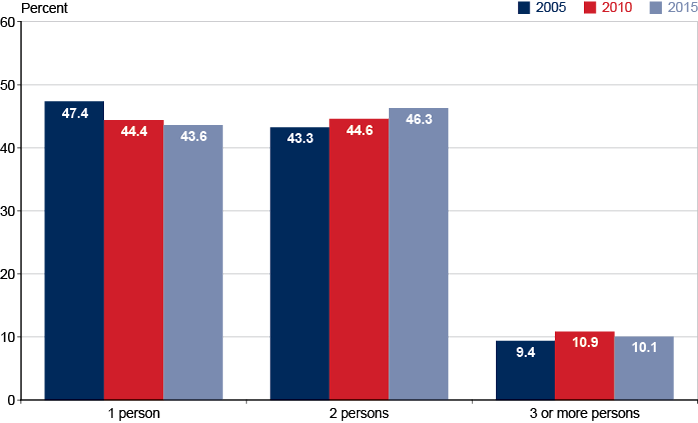
| Size of consumer unit | 2005 | 2010 | 2015 |
|---|---|---|---|
| 1 person | 47.4 | 44.4 | 43.6 |
| 2 persons | 43.3 | 44.6 | 46.3 |
| 3 or more persons | 9.4 | 10.9 | 10.1 |
Trends in Expenditures
Measured in 2015 dollars, median expenditures among CUs aged 65 or older increased from $27,028 in 2005 to $28,684 in 2010 and to $30,846 in 2015 (not shown). The proportion of CUs with total expenditures under $20,000 fell from 33 percent in 2005 to 31 percent in 2010 and to 27 percent in 2015, and the proportion with expenditures over $50,000 increased from 20 percent in 2005 to 22 percent in 2010 and to 25 percent in 2015.
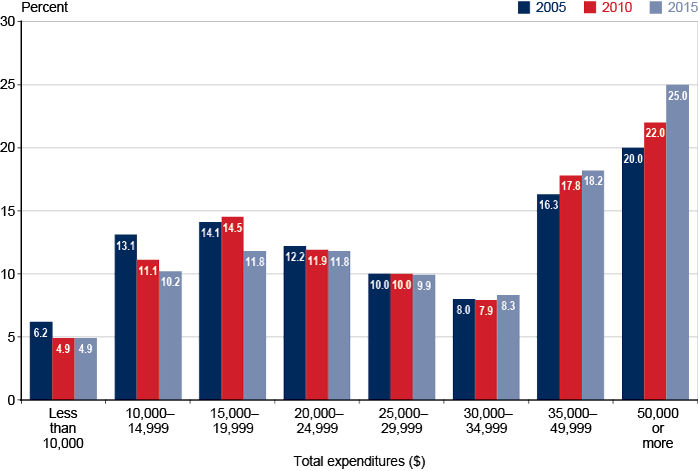
| Total expenditures ($) | 2005 | 2010 | 2015 |
|---|---|---|---|
| Less than 10,000 | 6.2 | 4.9 | 4.9 |
| 10,000–14,999 | 13.1 | 11.1 | 10.2 |
| 15,000–19,999 | 14.1 | 14.5 | 11.8 |
| 20,000–24,999 | 12.2 | 11.9 | 11.8 |
| 25,000–29,999 | 10.0 | 10.0 | 9.9 |
| 30,000–34,999 | 8.0 | 7.9 | 8.3 |
| 35,000–49,999 | 16.3 | 17.8 | 18.2 |
| 50,000 or more | 20.0 | 22.0 | 25.0 |
Trends in Expenditures by Component
The distribution of expenditures among CUs aged 65 or older changed relatively little between 2005 and 2015. Housing expenditures accounted for 34 percent of total aged CU expenditures in 2005 and 35 percent in both 2010 and 2015. Transportation expenditures fell from 16 percent of spending in 2005 to 14 percent in 2010 and then rose to 15 percent in 2015. Out-of-pocket spending for health care, including insurance premiums, comprised about 13 percent of expenditures in 2005, 2010, and 2015. Expenditures for food accounted for slightly more than 12 percent of total expenditures in all three years. Spending on entertainment rose by about one-half percentage point between 2005 and 2015, while apparel expenditures fell by about the same proportion. The share of expenditures allocated to all other spending fell from 17 percent in 2005 and 2010 to 16 percent in 2015.
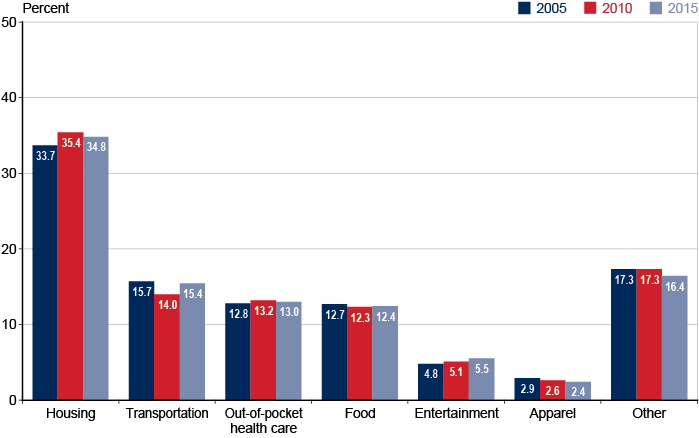
| Component | 2005 | 2010 | 2015 |
|---|---|---|---|
| Housing | 33.7 | 35.4 | 34.8 |
| Transportation | 15.7 | 14.0 | 15.4 |
| Out-of-pocket health care | 12.8 | 13.2 | 13.0 |
| Food | 12.7 | 12.3 | 12.4 |
| Entertainment | 4.8 | 5.1 | 5.5 |
| Apparel | 2.9 | 2.6 | 2.4 |
| Other | 17.3 | 17.3 | 16.4 |
Trends in Housing Tenure
The proportion of CUs aged 65 or older that owned a home with a mortgage was 19 percent in 2005 and 22 percent in both 2010 and 2015. The proportion that owned a home with no mortgage fell from 61 percent in 2005 to 57 percent in 2015. The proportion of CUs that rented a house or apartment was about 19 percent in both 2005 and 2010. That proportion increased to 21 percent in 2015.
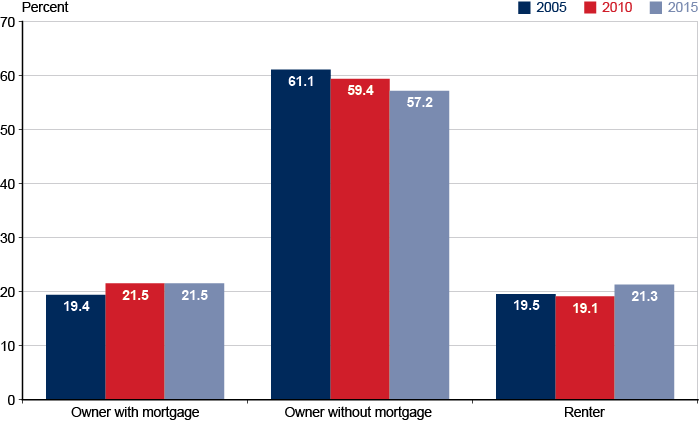
| Housing tenure | 2005 | 2010 | 2015 |
|---|---|---|---|
| Owner with mortgage | 19.4 | 21.5 | 21.5 |
| Owner without mortgage | 61.1 | 59.4 | 57.2 |
| Renter | 19.5 | 19.1 | 21.3 |
Trends in Housing Expenditures by Tenure
As shown earlier, the housing share of total expenditures increased among CUs aged 65 or older between 2005 and 2015. From 2005 to 2010, housing costs rose from 36 percent to 39 percent of total expenditures for CUs that owned a home with a mortgage. In the same span, housing costs rose only from 30 percent to 31 percent of total expenditures for home-owning CUs with no mortgage and remained flat among CUs that rented. By contrast, from 2010 to 2015, housing expenditures fell from 39 percent to 36 percent of total expenditures among CUs that owned a home with a mortgage, remained unchanged at 31 percent among CUs that owned a home with no mortgage, and rose from 46 percent to 49 percent among CUs that rented their homes.
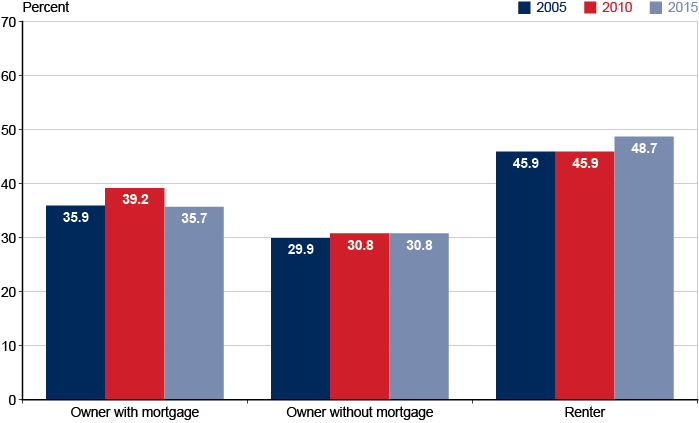
| Housing tenure | 2005 | 2010 | 2015 |
|---|---|---|---|
| Owner with mortgage | 35.9 | 39.2 | 35.7 |
| Owner without mortgage | 29.9 | 30.8 | 30.8 |
| Renter | 45.9 | 45.9 | 48.7 |
Trends in Out-of-Pocket Health Care Expenditures
Between 2005 and 2015, expenditures for health insurance rose sharply, while expenditures for prescription and over-the-counter drugs fell among CUs aged 65 or older. Measured in 2015 dollars, mean CU expenditures for health insurance premiums rose from $2,799 in 2005 to $3,358 in 2010 and $3,903 in 2015. Expenditures for medical services fell from $942 in 2005 to $861 in 2010 and then rose to $976 in 2015. Mean CU expenditures for drugs fell from $1,186 in 2005 to $875 in 2010 and to $672 in 2015. Expenditures for medical supplies rose from $172 in 2010 to $224 in 2015, but this category accounted for only about 4 percent of out-of-pocket health care expenditures among elderly CUs in 2015.
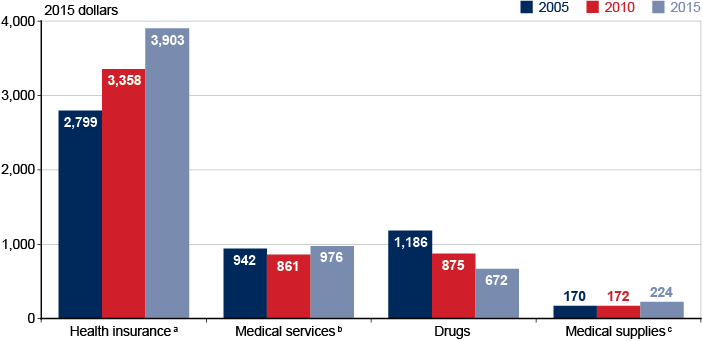
| Component | 2005 | 2010 | 2015 |
|---|---|---|---|
| Health insurance a | 2799 | 3358 | 3903 |
| Medical services b | 942 | 861 | 976 |
| Drugs | 1186 | 875 | 672 |
| Medical supplies c | 170 | 172 | 224 |
Trends in Out-of-Pocket Health Care Expenditures by Component
As a proportion of all out-of-pocket expenditures for health care among CUs aged 65 or older, health insurance premiums increased from 55 percent in 2005 to 64 percent in 2010 and 68 percent in 2015. Expenditures for drugs fell from 23 percent in 2005 to 17 percent in 2010 and 12 percent in 2015. Combined expenditures for medical services and medical supplies were relatively stable at 22 percent of total out-of-pocket health care expenditures in 2005, 20 percent in 2010, and 21 percent in 2015.
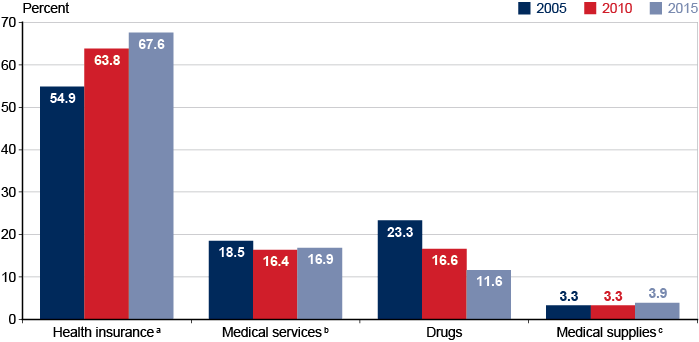
| Component | 2005 | 2010 | 2015 |
|---|---|---|---|
| Health insurance a | 54.9 | 63.8 | 67.6 |
| Medical services b | 23.3 | 16.6 | 11.6 |
| Drugs | 18.5 | 16.4 | 16.9 |
| Medical supplies c | 3.3 | 3.3 | 3.9 |
Comparison of Estimates Based on Consumer Expenditure Survey Public-Use File and Bureau of Labor Statistics Published Estimates
| Expenditure category | Consumer Expenditure Survey public-use file | Bureau of Labor Statistics | ||||
|---|---|---|---|---|---|---|
| Mean ($) | Standard error ($) | Coefficient of variation (%) | Mean ($) | Standard error ($) | Coefficient of variation (%) | |
| Total expenditures | 44,375 | 854 | 1.9 | 44,664 | 880 | 2.0 |
| Food | 5,503 | 125 | 2.3 | 5,506 | 125 | 2.3 |
| Housing | 15,447 | 353 | 2.3 | 15,529 | 365 | 2.3 |
| Apparel and services | 1,059 | 75 | 7.1 | 1,060 | 75 | 7.1 |
| Transportation | 6,848 | 336 | 4.9 | 6,846 | 335 | 4.9 |
| Health care | 5,775 | 129 | 2.2 | 5,756 | 128 | 2.2 |
| Entertainment | 2,460 | 151 | 6.1 | 2,464 | 151 | 6.1 |
| Personal care products and services | 573 | 24 | 4.2 | 573 | 24 | 4.3 |
| Reading materials | 175 | 15 | 8.6 | 175 | 15 | 8.6 |
| Education | 249 | 52 | 20.9 | 263 | 55 | 20.8 |
| Alcoholic beverages | 363 | 29 | 8.0 | 362 | 29 | 8.1 |
| Tobacco products | 209 | 14 | 6.7 | 209 | 14 | 6.6 |
| Miscellaneous | 729 | 72 | 9.9 | 900 | 91 | 10.1 |
| Cash contributions | 2,287 | 160 | 7.0 | 2,287 | 160 | 7.0 |
| Insurance and pensions | 2,698 | 143 | 5.3 | 2,733 | 142 | 5.2 |
| SOURCES: 2015 Consumer Expenditure Survey public-use file and the Bureau of Labor Statistics (https://www.bls.gov/cex/2015/combined/age.pdf). | ||||||
| NOTE: Mean values may differ between the public-use file and Bureau of Labor Statistics published estimates because some expenditures are top-coded. | ||||||